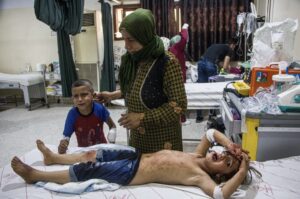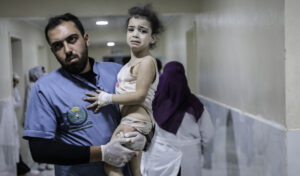You see their innocent faces smiling, and their feet frozen inside their torn shoes, running and frolicking among the alleys of the camps, talking spontaneously about their little dreams of returning home one day. They are unaware of what winter will bring them between its folds, and you realize then that there are millions of children from Syria and other Arab countries whose lives were torn apart in untold suffering.
Winter was, is, and will remain the best, most generous and giving season. We eagerly await it, to refresh the earth and water, the trees and flowers. We love the smell of its rain, we breathe a sigh of relief as we play amid its snow. We watch the beautiful rain showers fall lovingly on our windows, we clutch our covers and stay close to our heaters. We enjoy winter’s arrival. And we are pleased with its presence, it is the honorable visitor, dear guest, abundant in earthly wealth, and generous in its giving.
At every time of this year, the Imams of the mosques strive to pray for rain, and frequently pray that God bestows water on them with mercy, not in torrents, and not with torment.
Those in the camps have neither heaters nor a wood burner to save them from the cold; their shelter is a tent, its roof is cold and transparent, through which they see clouds upon clouds. Their stories of winter are painful, and their tragedies during the rain are endless.
We all feel sorrow and grief for the refugees who were displaced by the war and forcibly expelled from their safe and quiet homes. They have done nothing wrong, but that they are victims of battles that have no beginning and no end. Nothing compensates them for the loss of soft pillows, nor the walls of their homes. But many countries have an emergency plan to help them and support them in difficult weather conditions; in attempts to relieve them and help them to endure the bitter cold.
Every winter we hear countless tragic stories about them. It hurts the most to hear about a child who died from the cold! Does this not contradict the International Children’s Day, which falls on the 20th of November? According to a report issued by UNICEF: The number of children affected by the war in Syria ranges between 4 to 8 million, many of whom have been killed, and many who have lost their families and live as refugees. The organization also confirms that about 2 million refugee children are in need of Psychological and moral support to eradicate the grave psychological effects of the war on them, (and the same is true in Iraq, in Palestine, Jordan; and in every part of the Arab regions, which are experiencing the turmoil and destruction of wars).
Those most affected by these battles are children whose childhoods have been crushed, and their most basic rights to live in peace have been lost under a state that denies them housing, shelter, food, and education. These children need to be far from the sounds of shells and missiles that do not differentiate between old and young. These crush everyone and turn them into scattered pieces, lost in the midst of cruelty and violence. Innocent children are powerless, and their right to live in freedom and peace is lost.
The depth of our sense of the refugee problem goes beyond just international aid alone, it needs community solidarity as well. The individual in us feels the great reward of helping a refugee, alleviating the burden of winter on him, and providing everything we can to families affected by wars. Before we complain about the high price of diesel and our inability to use central heating, and complain of the smell of kerosene and gas from an ordinary heater–remember the people of the tents who can’t find a bonfire. Before we complain about the cold water and our electric heater and the resulting high electric bills, remember the refugees who wash in the snow as their limbs freeze.
Before you ask governments to turn on heaters in schools for your children wrapped in the finest fur, remember the tent children who do not learn, do not go to schools, and do not feel the taste of warmth or the pleasure of living. Before you complain that the snow-covered streets prevented you from going out to buy a bag of bread and “mash” or a “burger”, remember the tent people who do not feel the security of homes. They live day and night outside in a terrifying, dilapidated tent that does not cover or protect against the cold. If lucky, they eat crumbs of frozen bread, and their food does not have sweetness that gives them energy, nor do hot drinks tickle their frosty breath.
“I was complaining that I had no shoes until I saw someone without feet!”. These words are enough to give us a feeling of satisfaction with our lives if we compare it with the lives of refugees. We cannot imagine that a person who lives in difficult living conditions will have a normal soul, a satisfied heart, and a smile. No one can feel the tears shed by the poor who live in a tent, no one. We can imagine the immenseness of their pain, and that ache that squeezes their hearts. Perhaps winter will be more gentle with them, perhaps the rain will be lighter to give them more days of warmth, away from the noise of continuous showers that fall on their heads without stopping. Even if winter is late, it will come in the end. Then we will pray to God. We pray for them a lot. We will remember them in our prostration and weep for their bitter conditions.
We will ask the Lord to relieve them of the cold of winter and the harshness of the snow. We are not disappointed by raising our hands, hoping for the Lord of Heaven. Only he hears the supplication and answers the call. Have mercy, my God, on the peoples of the tents.


